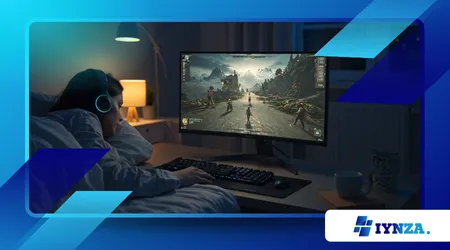Gaming and Sleep: Tips for Avoiding Late-Night Burnout

Gaming is fun, competitive, and endlessly engaging—but when late-night sessions become the norm, sleep can quickly take a hit.
Anúncios
And without proper rest, even the sharpest reflexes start to fade. Understanding the connection between gaming and sleep is essential for staying healthy, focused, and at the top of your game.
In this guide, we’ll explore how late-night gaming affects your sleep cycle, what signs to watch for when burnout starts creeping in, and practical tips to balance gameplay with recovery.
Gaming doesn’t have to cost you rest—if you know how to manage it right.
Why Sleep Matters More Than You Think
Sleep isn’t optional—it’s foundational. For gamers, sleep affects more than mood or energy. It impacts reaction time, decision-making, memory recall, and emotional stability.
When sleep is consistently disrupted, even the best players lose their edge. Fatigue sets in. Focus slips. Tilt becomes more likely. No amount of caffeine or hype can replace a full night’s rest.
A 2024 report from the International Gaming Wellness Council revealed that players who averaged fewer than six hours of sleep performed 21% worse on cognitive and reaction-based gaming tasks than those who slept seven to eight hours.
How Gaming Affects Sleep Patterns
Late-night gaming interferes with sleep in several ways. The most obvious is time. One more match often turns into two, then three, and suddenly it’s 3 a.m.
But it’s not just the clock. Screen light, emotional stimulation, and competitive stress all impact the body’s ability to wind down. Blue light from screens suppresses melatonin, a hormone critical for falling asleep.
Fast-paced gameplay keeps the brain in a state of alertness, making it harder to transition to sleep mode.
Games that rely on intense competition, like battle royales or ranked matchmaking, spike adrenaline and cortisol—hormones that directly oppose relaxation.
Read also: How to Build the Ultimate Retro Gaming Setup
Signs of Late-Night Burnout
Gaming burnout doesn’t always show up with a warning label. It often builds slowly. You might begin skipping meals. Neglecting social interactions. Feeling irritable after playing. Or forcing yourself to log in even when you’re exhausted.
Other signs include:
- Decreased motivation to play.
- Physical fatigue even after waking.
- Poor concentration during matches.
- Mood swings tied to performance.
- Trouble falling or staying asleep.
If any of these feel familiar, it may be time to examine the balance between your gaming routine and your recovery habits.
Two Real-World Examples
A semi-pro Apex Legends player trained five to six hours each night after work, often logging off past midnight.
After noticing a decline in aim consistency and increased irritability with teammates, they began ending sessions by 10 p.m. Within three weeks, both gameplay and team synergy improved.
A university student spent late nights grinding ranked matches in League of Legends.
After a semester of poor grades and daily exhaustion, they implemented a strict gaming curfew and started using blue light filters. Not only did sleep quality improve, but so did their in-game performance.
Practical Tips for Balancing Gaming and Sleep
You don’t have to choose between gaming and rest. It’s about managing your sessions with intention.
Set a hard cutoff time. Pick a specific time to log off and stick to it. Consistency helps your brain learn when to shift gears and prepare for sleep.
Use warm lighting at night. Replace white LEDs with warmer hues. Enable night mode on all screens after sunset to reduce melatonin disruption.
Avoid competitive games close to bedtime. Opt for slower-paced or story-driven titles during your wind-down period.
Take post-game breaks. After intense sessions, allow 30 minutes before bed to stretch, hydrate, and disconnect from the screen.
Track your sleep. Use a smartwatch or app to monitor your sleep habits and see how different routines affect your rest.
Stay hydrated and avoid caffeine late. Dehydration and stimulants both interfere with quality sleep. Switch to water in the evening.
One Analogy to Remember
Think of your brain like a GPU. Without proper cooling—your sleep—it overheats, throttles performance, and eventually burns out. Gaming pushes your mental hardware. Sleep resets and cools it down.
But it’s more than just cooling. Sleep is where your brain consolidates memory, strengthens learning pathways, and clears out cognitive ‘waste.’ Skipping that recovery phase is like gaming on outdated drivers—things start to glitch in ways you don’t immediately notice.
One night of sleep deprivation might not crash your performance, but over time, it chips away at your precision, judgment, and patience.
A Statistic That Hits Home
According to a 2025 Sleep and Gaming Study, 64% of gamers who made even small changes to their nighttime routine—like adjusting screen time or sleeping earlier—reported better mood, higher win rates, and improved overall health within 30 days.
Additionally, those who prioritized consistent bedtimes saw a 28% reduction in reported in-game frustration and tilt-related arguments with teammates.
These aren’t just numbers—they’re reflections of the tangible benefits better sleep brings to every match.
A Question Worth Asking
If you play better, feel better, and last longer in-game with more sleep… why not make it part of your strategy?
You wouldn’t enter ranked with a dead controller or out-of-date settings. So why face your opponents with a brain running on fumes? What if your greatest upgrade isn’t your gear—but your routine?
Conclusion
Gaming and sleep don’t have to be enemies. Late-night burnout is avoidable when you treat sleep with the same respect you give your gameplay. The best players know when to push—and when to pause.
If your goal is long-term growth, energy, and high-level performance, rest is not a luxury. It’s a core mechanic of your success.
Learn when to log off. Your body, your brain, and your win rate will thank you.
FAQ
1. How many hours of sleep should gamers aim for?
Most experts recommend 7 to 9 hours per night for optimal mental performance and recovery.
2. Is it bad to play games before bed?
Not always. Relaxing or slow-paced games are fine, but competitive ones can spike alertness and delay sleep.
3. What’s the best way to transition from gaming to sleep?
Create a routine: log off, stretch, dim lights, and engage in a non-screen activity like reading for 20–30 minutes.
4. Can sleep actually improve my gameplay?
Yes. Better sleep enhances reaction time, memory, focus, and emotional regulation during high-pressure moments.
5. What if my schedule only allows late-night gaming?
Protect your wind-down time. Use blue light filters, avoid caffeine, and maintain a consistent sleep schedule even with late sessions.
